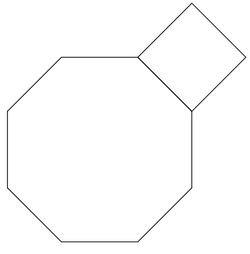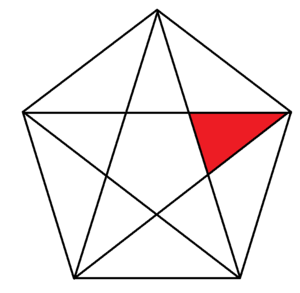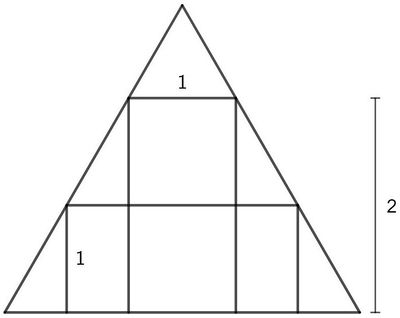Difference between revisions of "2021 JMPSC Accuracy Problems"
| Line 12: | Line 12: | ||
==Problem 2== | ==Problem 2== | ||
| + | Three distinct even positive integers are chosen between <math>1</math> and <math>100,</math> inclusive. What is the largest possible average of these three integers? | ||
| + | |||
| + | [[2021 JMPSC Accuracy Problems/Problem 2|Solution]] | ||
| + | |||
| + | ==Problem 3== | ||
| + | In a regular octagon, the sum of any three consecutive sides is <math>90.</math> A square is constructed using one of the sides of this octagon. What is the area of the square? | ||
| + | <center> | ||
| + | [[File:Octagonsquare.jpg|250px]] | ||
| + | </center> | ||
| + | |||
| + | [[2021 JMPSC Accuracy Problems/Problem 3|Solution]] | ||
| + | |||
| + | ==Problem 4== | ||
| + | If <math>\frac{x+2}{6}</math> is its own reciprocal, find the product of all possible values of <math>x.</math> | ||
| + | |||
| + | [[2021 JMPSC Accuracy Problems/Problem 4|Solution]] | ||
| + | |||
| + | ==Problem 5== | ||
| + | Let <math>n!=n \cdot (n-1) \cdot (n-2) \cdots 2 \cdot 1</math> for all positive integers <math>n</math>. Find the value of <math>x</math> that satisfies <cmath>\frac{5!x}{2022!}=\frac{20}{2021!}.</cmath> | ||
| + | |||
| + | [[2021 JMPSC Accuracy Problems/Problem 5|Solution]] | ||
| + | |||
| + | ==Problem 6== | ||
| + | In quadrilateral <math>ABCD</math>, diagonal <math>\overline{AC}</math> bisects both <math>\angle BAD</math> and <math>\angle BCD</math>. If <math>AB=15</math> and <math>BC=13</math>, find the perimeter of <math>ABCD</math>. | ||
| + | |||
| + | [[2021 JMPSC Accuracy Problems/Problem 6|Solution]] | ||
| + | |||
| + | ==Problem 7== | ||
| + | If <math>A</math>, <math>B</math>, and <math>C</math> each represent a single digit and they satisfy the equation <cmath>\begin{array}{cccc}& A & B & C \\ \times & & &3 \\ \hline & 7 & 9 & C\end{array},</cmath> find <math>3A+2B+C</math>. | ||
| + | |||
| + | [[2021 JMPSC Accuracy Problems/Problem 7|Solution]] | ||
| + | |||
| + | ==Problem 8== | ||
| + | How many triangles are bounded by segments in the figure and contain the red triangle? (Do not include the red triangle in your total.) | ||
| + | <center> | ||
| + | [[File:Sprint2 .png|300px]] | ||
| + | </center> | ||
| + | |||
| + | [[2021 JMPSC Accuracy Problems/Problem 8|Solution]] | ||
| + | |||
| + | ==Problem 9== | ||
| + | If <math>x_1,x_2,\ldots,x_{10}</math> is a strictly increasing sequence of positive integers that satisfies <cmath>\frac{1}{2}<\frac{2}{x_1}<\frac{3}{x_2}< \cdots < \frac{11}{x_{10}},</cmath> find <math>x_1+x_2+\cdots+x_{10}</math>. | ||
| + | |||
| + | [[2021 JMPSC Accuracy Problems/Problem 9|Solution]] | ||
| + | |||
| + | ==Problem 10== | ||
| + | In a certain school, each class has an equal number of students. If the number of classes was to increase by <math>1</math>, then each class would have <math>20</math> students. If the number of classes was to decrease by <math>1</math>, then each class would have <math>30</math> students. How many students are in each class? | ||
| + | |||
| + | [[2021 JMPSC Accuracy Problems/Problem 10|Solution]] | ||
| + | |||
| + | ==Problem 11== | ||
| + | If <math>a : b : c : d=1 : 2 : 3 : 4</math> and <math>a</math>, <math>b</math>, <math>c</math>, and <math>d</math> are divisors of <math>252</math>, what is the maximum value of <math>a</math>? | ||
| + | |||
| + | [[2021 JMPSC Accuracy Problems/Problem 11|Solution]] | ||
| + | |||
| + | ==Problem 12== | ||
| + | A rectangle with base <math>1</math> and height <math>2</math> is inscribed in an equilateral triangle. Another rectangle with height <math>1</math> is also inscribed in the triangle. The base of the second rectangle can be written as a fully simplified fraction <math>\frac{a+b\sqrt{3}}{c}</math> such that <math>gcd(a,b,c)=1.</math> Find <math>a+b+c</math>. | ||
| + | |||
| + | <center> | ||
| + | [[File:Sprint13.jpg|400px]] | ||
| + | </center> | ||
| + | |||
| + | [[2021 JMPSC Accuracy Problems/Problem 12|Solution]] | ||
| + | |||
| + | ==Problem 13== | ||
| + | Let <math>x</math> and <math>y</math> be nonnegative integers such that <math>(x+y)^2+(xy)^2=25.</math> Find the sum of all possible values of <math>x.</math> | ||
| + | |||
| + | [[2021 JMPSC Accuracy Problems/Problem 13|Solution]] | ||
| + | |||
| + | ==Problem 14== | ||
| + | What is the leftmost digit of the product <cmath>\underbrace{161616 \cdots 16}_{100 \text{ digits }} \times \underbrace{252525 \cdots 25}_{100 \text{ digits }}?</cmath> | ||
| + | |||
| + | [[2021 JMPSC Accuracy Problems/Problem 14|Solution]] | ||
| + | |||
| + | ==Problem 15== | ||
| + | For all positive integers <math>n,</math> define the function <math>f(n)</math> to output <math>4\underbrace{777 \cdots 7}_{n\ \text{sevens}}5.</math> For example, <math>f(1)=475</math>, <math>f(2)=4775</math>, and <math>f(3)=47775.</math> Find the last three digits of <cmath>\frac{f(1)+f(2)+ \cdots + f(100)}{25}.</cmath> | ||
| + | |||
| + | [[2021 JMPSC Accuracy Problems/Problem 15|Solution]] | ||
Revision as of 20:48, 10 July 2021
- This is a fifteen question free-response test. Each question has exactly one integer answer.
- You have 60 minutes to complete the test.
- You will receive 4 points for each correct answer, and 0 points for each problem left unanswered or incorrect.
- Figures are not necessarily drawn to scale.
- No aids are permitted other than scratch paper, graph paper, rulers, and erasers. No calculators, smartwatches, or computing devices are allowed. No problems on the test will require the use of a calculator.
- When you finish the exam, please stay in the Zoom meeting for further instructions.
Contents
Problem 1
Find the sum of all positive multiples of ![]() that are factors of
that are factors of ![]()
Problem 2
Three distinct even positive integers are chosen between ![]() and
and ![]() inclusive. What is the largest possible average of these three integers?
inclusive. What is the largest possible average of these three integers?
Problem 3
In a regular octagon, the sum of any three consecutive sides is ![]() A square is constructed using one of the sides of this octagon. What is the area of the square?
A square is constructed using one of the sides of this octagon. What is the area of the square?
Problem 4
If ![]() is its own reciprocal, find the product of all possible values of
is its own reciprocal, find the product of all possible values of ![]()
Problem 5
Let ![]() for all positive integers
for all positive integers ![]() . Find the value of
. Find the value of ![]() that satisfies
that satisfies ![]()
Problem 6
In quadrilateral ![]() , diagonal
, diagonal ![]() bisects both
bisects both ![]() and
and ![]() . If
. If ![]() and
and ![]() , find the perimeter of
, find the perimeter of ![]() .
.
Problem 7
If ![]() ,
, ![]() , and
, and ![]() each represent a single digit and they satisfy the equation
each represent a single digit and they satisfy the equation ![\[\begin{array}{cccc}& A & B & C \\ \times & & &3 \\ \hline & 7 & 9 & C\end{array},\]](http://latex.artofproblemsolving.com/d/9/2/d92d1fb62e2b18f640a996cd6d7f7f0ed2cf655b.png) find
find ![]() .
.
Problem 8
How many triangles are bounded by segments in the figure and contain the red triangle? (Do not include the red triangle in your total.)
Problem 9
If ![]() is a strictly increasing sequence of positive integers that satisfies
is a strictly increasing sequence of positive integers that satisfies ![]() find
find ![]() .
.
Problem 10
In a certain school, each class has an equal number of students. If the number of classes was to increase by ![]() , then each class would have
, then each class would have ![]() students. If the number of classes was to decrease by
students. If the number of classes was to decrease by ![]() , then each class would have
, then each class would have ![]() students. How many students are in each class?
students. How many students are in each class?
Problem 11
If ![]() and
and ![]() ,
, ![]() ,
, ![]() , and
, and ![]() are divisors of
are divisors of ![]() , what is the maximum value of
, what is the maximum value of ![]() ?
?
Problem 12
A rectangle with base ![]() and height
and height ![]() is inscribed in an equilateral triangle. Another rectangle with height
is inscribed in an equilateral triangle. Another rectangle with height ![]() is also inscribed in the triangle. The base of the second rectangle can be written as a fully simplified fraction
is also inscribed in the triangle. The base of the second rectangle can be written as a fully simplified fraction ![]() such that
such that ![]() Find
Find ![]() .
.
Problem 13
Let ![]() and
and ![]() be nonnegative integers such that
be nonnegative integers such that ![]() Find the sum of all possible values of
Find the sum of all possible values of ![]()
Problem 14
What is the leftmost digit of the product ![]()
Problem 15
For all positive integers ![]() define the function
define the function ![]() to output
to output ![]() For example,
For example, ![]() ,
, ![]() , and
, and ![]() Find the last three digits of
Find the last three digits of ![]()












